
Otago Chamber of Commerce chief executive Dougal McGowan was disappointed there appeared to be no targeted fast-track money to upgrade Dunedin Hospital.
However, he welcomed the strong emphasis on innovation, skills and job creation, apprenticeships and the support for business to make that happen.
The added $8 million funding over four years for the Regional Business Partners Programme was a welcome addition.
"The increased funding for science and innovation, tertiary education and apprentices will help develop a skilled workforce needed for the future. Of particular interest will be the detail around the regional economic development package and how we can leverage off that here in Dunedin.''
Polson Higgs partner Michael Turner said the Budget was notable for the lack of anything terribly surprising.
The focus on prudent fiscal management remained, as did the return to a budget surplus and reducing government debt.
"All very aspirational if not a little boring. The main tax initiatives were signalled by Prime Minister John Key on April 13, 2016. Their inclusion as a Budget announcement more than a month later is stretching things a little.''
With 2017 being an election year, it would be interesting to see if next year's Budget retained the same tight fiscal management or if a greater level of spending occurred in an election year, he said.
Crowe Horwarth tax principal Scott Mason said from a tax perspective there was little, if anything, to get excited about.
The remainder of the Budget reflected both where New Zealand sat in the electoral cycle and the social issues of the day.
There was extra money for health, education and welfare, focusing on the economically disadvantaged sector in society.








